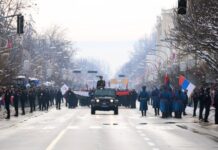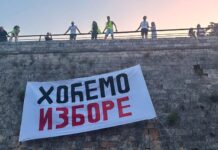The Association Perspektiva Plus, in collaboration with the production company Mebius Film from Sarajevo, has produced 530 episodes that were broadcast on 36 TV stations across the region. This project is realized in cooperation with NED (National Endowment for Democracy, Washington) and Radio Free Europe, which publishes a new episode on its portal every Sunday. The aim of the project is to focus on young people in the countries of the Western Balkans, providing them with a platform for dialogue both with their peers and with the authorities. One participant shared that appearing on PERSPEKTIVA showed him that “you can have innovative ideas to change this whole country. I am not politically engaged, but PERSPEKTIVA showed me that as a citizen, I can take part, express my opinion, and address the authorities…”
Young people have a space where they can freely voice their opinions, and for Petra from Prozor-Rama, this is the most fulfilling aspect. “I’m glad that there is someone who cares about our voice and our opinions.”
https://www.youtube.com/watch?v=yTqJaTgfuJQ&ab_channel=RadioSlobodnaEvropa
More than 15,000 young people have shared their views on the show. They’ve told thousands of stories: a boy from Mostar was taken by PERSPEKTIVA over to the other side of the Old bridge, a place he’d never been before; a girl from Podgorica shared how she survived violence; a young man from Belgrade talked of the controlling influence of soccer fan groups; a Kosovar expressed his horror at how society treats women; a Roma woman from North Macedonia talked of enduring discrimination; and a girl from Bijeljina called out the authorities for failing to protect victims of sexual violence and punish the perpetrators. Their stories also sparked reactions in traditional media. Young people spoke about their frustration with the state of affairs in their countries, their inability to resist party recruitment, and about outdated education systems that teach them “to memorize, not to think.” They don’t want to leave if they don’t have to, but like Jelena from Podgorica, they ask:
“I don’t want to leave, but what does Montenegro offer me?”
https://www.slobodnaevropa.org/a/perspektiva-specijal-u-podgorici/31967591.html
PERSPEKTIVA wants to motivate young people to not give up and to fight for change, much like the youth in Serbia have been doing recently. In societies that are increasingly becoming radicalized, young people are the ones being manipulated—and they are aware of it. One of the hosts of the show, Marko Selić-Marcelo, commented on the protests in Belgrade and Serbia, stating that he wasn’t surprised by the youth’s wisdom or the protests themselves because, for years, he’s been talking to young people on PERSPEKTIVA and has seen their dissatisfaction growing. They may come from different backgrounds, religions, and nations, but they engage in a dialogue of tolerance, diversity, and sensibility. They listen to each other, accept or reject arguments, and understand one another. They change, and their horizons expand.
In PERSPEKTIVA, they have presented their arguments to the President of Montenegro, the Prime Ministers of Kosovo and North Macedonia, as well as the Prime Minister of Montenegro. They’ve spoken with ministers, ambassadors, and members of parliament. And they’ve told everyone, like Andrijana from Belgrade, the same thing: “Don’t divide us.”
“Nobody hates anyone here. I don’t think hatred exists; it’s neither natural nor human. We’re just taught to hate. It’s very hard for me, and it upsets me to talk about it. We were told we have to hate our neighbor just because of their religion. That’s… I don’t know, it’s terrible for me. So, it’s not a matter of me feeling it, it’s that I was told to.”
https://www.slobodnaevropa.org/a/perspektiva-beograd-20-02-22/31712505.html
PERSPEKTIVA is followed by over 22,000 people from all over the region on Facebook. Some videos have garnered over 600,000 views. In the last three months of the previous year alone, PERSPEKTIVA’s posts reached almost a million views, with an engagement of 388,000 individual users. On Instagram, they recorded 440,000 views during the same period, while TikTok saw just under 300,000 views. Combined, the videos were viewed more than 750,000 times across these two platforms, reaching 420,000 people.
On the website https://perspektiva.plus/, young people continue to express their views on current events. They explain why they protest, what they like, and what they don’t. They are united in their stance against any form of discrimination, often highlighting the discrimination against women and LGBTQ+ individuals. They speak about peer violence and the traumas passed down by parents and adults. They are deeply disappointed with the education system, and they all agree with Benjamin from BiH, who put it bluntly: “We’re learning from books that are 40 or 50 years old, written in the days of the former state, while technology and everything else progress daily.”
https://www.youtube.com/watch?v=bPCUMCQ_O_M&ab_channel=RadioSlobodnaEvropa
They have a message for the older generation, as expressed by Nađa from Podgorica:
“What do the older generations need to hear from us? It’s that we are very angry that they have left it to us to solve the problems of the Balkans!”
https://www.youtube.com/watch?v=30EixzYetRQ&ab_channel=RadioSlobodnaEvropa
The problems of the Balkans can only be solved if each country begins by addressing its own issues. Petar from Belgrade puts it simply:
“I think it is the responsibility of this country, the Republic of Serbia, the state, to acknowledge the crimes it committed against other nations and peoples during the wars of the 90s. Yes, it was a war—things happen in wars, heinous things—and different positions attempt to justify certain acts. But this country, and especially its leaders, headed by Aleksandar Vučić, who on the hills of Sarajevo committed unspeakable acts that disgust me, should be held accountable. He should be behind bars for that, in my opinion. He needs to come forward and accept responsibility publicly.”
https://www.slobodnaevropa.org/a/perspektiva-beograd-20-02-22/31712505.html
Whatever the future of the Western Balkans may hold, young people will, in one way or another, play a role in shaping it and correcting what needs to be fixed. Any effort to give attention and care to these generations reduces the likelihood that they will repeat the violent history of this region. Young people know this.















